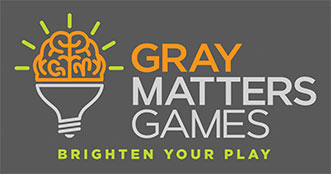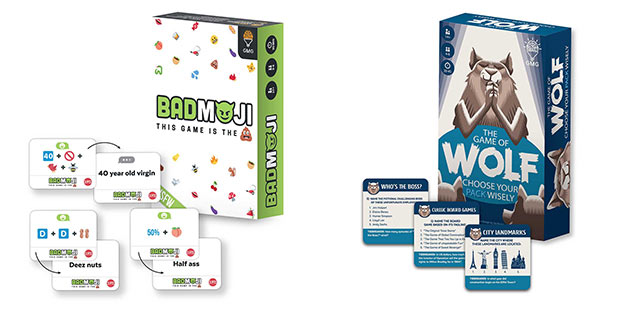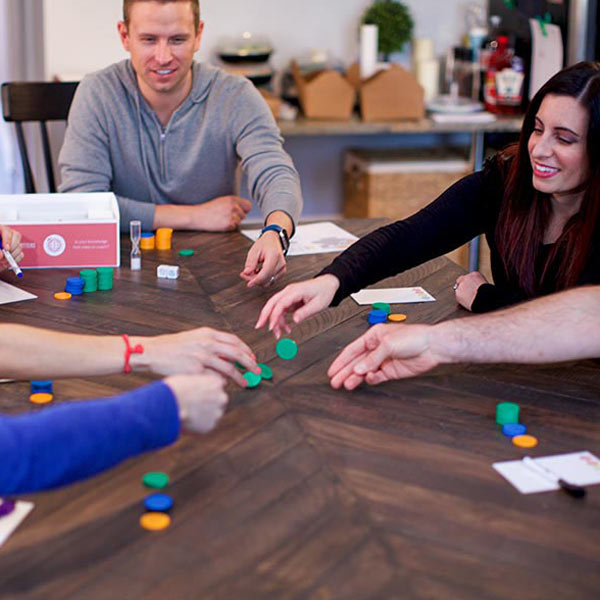The New York Toy Fair isn’t all fun and games. Okay, technically, it is all fun and games, but the stakes couldn’t be higher. For the thousands of exhibitors who pitch their products – many of them small businesses trying to break into an overcrowded market – the future of their business is on the line. They stand to win (or lose) just about everything.
It was at the 2018 Toy Fair where Lauren and Joe Barron were first discovered.
Just a year before, in 2017, Joe left a lucrative career in finance to launch a startup with Lauren.
The couple had just taken a road trip with Lauren’s family. To pass the hours on the highway, they made a game, a clever hybrid of trivia and betting. It was good. More than “good,” it was approachable and addictive, seemingly simple yet deceptively complex, totally familiar and, somehow, utterly original. (The game would eventually become their company’s first product, You Bet-cha!) Hours flew by and the family was engrossed. Someone suggested they should do this for a living. The Barrons agreed.

The couple had discovered their passion: creating games that make you laugh, smile, blush and think. They decided to turn it into a business – and not just any business, but one with a purpose.
“When we started thinking about who we wanted to be, we really wanted to do something that had a social impact,” Joe says. “We want to be a force for good.”
Joe and Lauren founded a company with two missions. First, to bring people together and stimulate brain activity, a much-needed therapy for our smartphone-addled minds. And second, to raise money for Alzheimer’s research, after Joe lost two grandmothers to the disease.
They had a business. Now, all they needed was a name, something that captured the importance of our brains and how we use them.
A quick brainstorm later, and they settled on “Gray Matters Games.” (Take a closer look at their logo, and you’ll see a G and an M amid the cerebral swirls.)
Back at the 2018 Toy fair, a sales representative approached the Gray Matters Games table, bumping elbows with a crowd of nearly 30,000. There, they met an excited, if somewhat stressed, pair of entrepreneurs. The stakes were especially high for Joe and Lauren. The market was extremely competitive, there weren’t any investors backing their business, and Joe had just left his job. They were the quintessential startup. And, as if there wasn’t already enough pressure to succeed, a baby girl was on her way, due in seven months.

The couple took the sales rep through a round of Ridiculous Expositions, a card game for adults where teams attempt to translate seemingly innocent phrases into their less-than-innocent counterparts. (One of the cards reads, “Sofa King Awe Sum!”) Like other Gray Matters creations, Ridiculous Expositions is fast, quirky, easy to pick up, and beautifully crafted with cartoonish illustrations and tight game design. The look is iconic, and the gameplay is addictive. It instantly draws you in and makes you laugh. And then you want to play again.
“As you’re growing, the working capital portion becomes really important. You have to find a way to cover those costs, and that’s hard to do on your own.
The sales rep was impressed. So impressed, they pitched it to a well-connected retail buyer over dinner that same night. Within two weeks, a deal was signed. Ridiculous Expositions would be on the shelves of nearly 700 Target stores across the nation.
The Barrons had made their big break.
Now, the hard work could really begin.
A good idea is only the beginning of a successful business, as Joe and Lauren soon learned. After the initial thrill of landing a deal with Target, the couple had to consider the immense logistical and financial challenge of actually fulfilling such an order, a project far larger in scope than anything the couple had encountered before. Creating a prototype for Toy Fair was one thing. To fulfill the Target order, they would need to produce 20,000 copies of the game – at 400 cards per box, that adds up to about 8 million individual cards – and they would have to cover all the production costs upfront, which meant a heavy investment.

“We’re bootstrapping our business,” Joe says. “As you’re growing, the working capital portion becomes really important. You have to find a way to cover those costs, and that’s hard to do on your own.”
The Barrons are a business-savvy couple – both have MBA’s – but they had never owned a small business before Gray Matters Games. They didn’t anticipate the growing pains, and they didn’t expect to encounter so many roadblocks in such rapid succession. They felt like they had just rounded a bend and entered the rapids. Suddenly, the couple had to face a whole slew of challenges – finances, logistics, marketing and operations, to name a few – things that have seemingly nothing to do with what the Barrons do best: creating smart, ingeniously addictive party games.
Their business seemed to be on its way to success. But, to survive, they needed some help.
Soon after landing a deal with Target, Gray Matters Games joined Innovation DuPage’s Incubation program. Based in our Glen Ellyn headquarters, Incubation connects startups and developing businesses (like the Barron’s) with peer entrepreneurs, mentors, resources, investors and talent. As members, Joe and Lauren have connected with people who understand the challenges they face and can provide the support they need.
“We could use help on the marketing side, financing, and even bringing in new employees and interns,” Joe says. “Those are things we’ve never done before.”
“Now, at ID, we’re working in this space where we can just tap someone on the shoulder and get the help we need.”
Today, the Barrons live in Glen Ellyn with their daughter and a rowdy pair of Vizslas, Gipper and Rudy (think: Weimaraners, with extra-floppy ears).
Some things have changed since landing the Target deal, but most things are just as they were before. In this house, most nights are game nights. The doorbell rings. Pizza arrives. Friends and family gather around the table to “test” new games and toss around ideas. Lauren and Joe play with note cards within reach. Throughout the evening, a flash of inspiration might strike. When it does, the Barrons jot it down on a notecard and add it to a growing stack. Often, these notecards stay in the stack and gather dust. A few times, they have met a fateful end in the jaws of Gipper and Rudy. But, every so often, an idea takes root and grows into something bigger.

For Joe, the feeling of seeing his product on the shelves of a major retailer is as surreal as ever.
“With Ridiculous Expositions, we had an idea, we wrote it on a card, and now it’s sold nation-wide at Target,” he says.
The Target deal was a turning point for Gray Matters Games. Since then, the business has produced two new products, Badmoji and The Game of Wolf. Both are set to launch soon on Amazon, as well as on the shelves of 80 Sunrise Records stores across Canada. Wolf, incidentally, is a finalist for the Mensa Select award, one of the most prestigious honors in the game industry.
Another piece of good news: Gray Matters Games is about to grow significantly. The Barrons say they are close to landing a lucrative deal with another major retailer (but the details are top-secret, for now).
Building a business is more difficult than most people could imagine, which is why about half of all small businesses fail within three years. Having a big idea is one thing; to transform it into a successful business, you need the right support. As Gray Matters Games continues to grow in its second year, Joe and Lauren are going to face even more challenges – some of which they’ll anticipate, others that will come out of nowhere. But they’re not alone.
As members of the ID Incubation program, the couple has a community at their backs. They have the people, the resources and the support they need to continue transforming their big ideas into a successful business. In return, they plan to give back to fellow entrepreneurs along the way.
“I think we’ll all be sharing ideas on how to grow our businesses,” says Joe. “I have a background in corporate development, and I’ll use it to help others in the program any way I can. That’s what this is about: building a community.”

